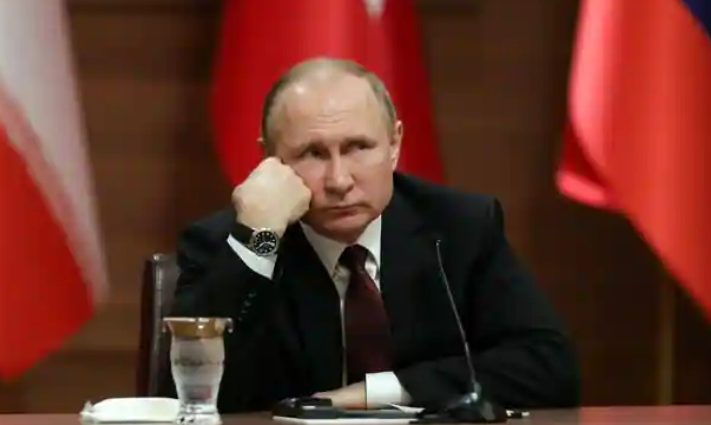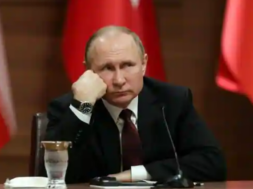
Roving Periscope: Russia may win war in Ukraine, but go the Sri Lanka way
Virendra Pandit
New Delhi: It may just be a pyrrhic, military victory for Russia over Ukraine. Moscow may win the war but heavily lose its economy, starting in May.
A month into the highly expensive war, it started telling on the Russian economy. Annual inflation in Russia zoomed to 14.53 percent as of March 18, its highest since November 2015 and up from 12.54 percent just a week earlier. The battered rouble sent prices of essential commodities soaring under unprecedented sanctions.
Unlike Sri Lanka, Russia, for now, has the money in its own currency, the rouble, but it cannot import because the West froze its dollar and euro reserves.
Overlooking what may come next, Russia on Monday warned the remaining Ukrainian forces in Mariupol, which would clear its eastern land route to the Crimea it annexed in 2014, to surrender at the earliest. Moscow claimed it had secured most urban areas in Mariupol, but Kyiv rejected it.
If true, Mariupol will be the first major Ukrainian city to have fallen to Russian forces since the inconclusive invasion began on February 24. But any Mariupol win also showcases Russian failures in the western parts of Ukraine which forced Moscow to focus on the east.
The 54-day-long ongoing war, despite the wanton destruction of Ukraine which left a trail of death, has yielded little for Russia. Over four million Ukrainians have so far fled their war-ravaged country, and both Moscow and Kyiv have warned of the “Third World War” and a nuclear Armageddon, amid failed attempts for a ceasefire.
The West and its allies, which have imposed waves of sanctions against Russia, its interests, and its leaders, have so far failed to deter Moscow. Now, the European Union will “look at” Russia’s Sberbank in its next round of sanctions over the war in Ukraine, European Commission President Ursula von der Leyen told Germany’s media on Sunday.
“We continue to look at the banking sector, especially Sberbank, which alone accounts for 37 percent of Russia’s banking sector,” she said when asked about potential elements of a sixth sanctions package. The EU will allocate another 50 million euros (USD 54 million) of humanitarian support for the Ukrainian people and refugees.
Meanwhile, these sanctions have started adversely affecting the Russian economy.
Last week, global rating agency Moody’s said Moscow may default by May 4 because it tried to service its dollar bonds in roubles in April. It shows the impact of Russia’s exclusion from the Western financial system since its invasion of Ukraine.
If the West declares Moscow in default, it would mark Russia’s first major default on foreign bonds after the 1917 Bolshevik revolution. The Kremlin claimed the West is forcing a default by imposing crippling sanctions.
This possibility emerged when Russia made a payment due on April 4 on two sovereign bonds, maturing in 2022 and 2042, in roubles rather than the US dollars they mandated it to pay under the terms of the securities.
Russia “therefore may be considered a default, under Moody’s definition, if not cured by 4 May, which is the end of the grace period,” Moody’s said in a statement on Thursday last week.
“The bond contracts have no provision for repayment in any other currency other than dollars.”
Moody’s said the Russian Eurobonds issued before 2018, such as those maturing in 2022 and 2042, do not allow payments in roubles. In early April, Finance Minister Anton Siluanov had told the Izvestia newspaper that the West forced Russia into default, it will take legal action.
Before February 24, they rated Moscow as investment grade. But its sovereign bonds have become a target in what the Kremlin says is an economic war waged by the United States.
In 1988, Russia defaulted on USD 40 billion in domestic debt and devalued the rouble under President Boris Yeltsin because it was effectively bankrupt after the Asian debt crisis and falling oil prices shook confidence in its short-term rouble debt, the media reported.
Earlier, in 1918, Bolshevik revolutionaries under Vladimir Lenin repudiated Tsarist debt, shocking global debt markets because Russia then had one of the world’s biggest foreign debt piles.
This time, Russia has the money but cannot pay because its foreign currency reserves, the world’s fourth-largest, that President Vladimir Putin ordered be built up for just such a crisis, are frozen by the United States, European Union, Britain, and Canada.
However, as Russia cannot borrow right now, a default might still be symbolic, marking the failure of its post-Cold War attempt to integrate into the West’s financial architecture. It may, however, drag down the Russian economy soon.
Interestingly, while Russia has only USD 40 billion in foreign bonds outstanding across 15 dollars or euro-denominated issues, its corporates have built up vastly more foreign debt.
In early April, the US Treasury stopped Russia’s ability to use foreign currency reserves held by the Russian central bank at American financial institutions to pay its debt.
Reacting to this, the Kremlin claimed the West had already ‘defaulted’ on its obligations to Russia by freezing reserves. It also advocated a new system to replace the Bretton Woods financial architecture established by the Western powers in 1944.
Early in April, another rating agency S&P lowered Russia’s foreign currency ratings to “selective default” on increased risks that Moscow will not be able and willing to honor its commitments to foreign debt-holders.
As of now, Russia’s economy is heading for the worst contraction since the years following the 1991 fall of the Soviet Union, with soaring inflation and capital flight.













